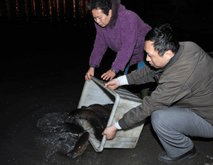AFP, February 21, 2010
Taipei, Taiwan — The small group gathered after dark at Taipei’s Tamshui River with tanks of catfish could be easily mistaken for fishermen if not for their sombre looks and what they do to the animals.
 Reciting Buddhist prayers, they haul one tank after the other to the river’s edge and tip it over, releasing the meaty, shiny fish into the black water. “May good karma come back to us,” they chant at the end of the ceremony, one of hundreds that take place every year in Taiwan.
Reciting Buddhist prayers, they haul one tank after the other to the river’s edge and tip it over, releasing the meaty, shiny fish into the black water. “May good karma come back to us,” they chant at the end of the ceremony, one of hundreds that take place every year in Taiwan.
Freeing captive animals is an age-old religious tradition and is intimately linked to Buddhism, Taiwan’s predominant faith, reflecting its emphasis on protecting life in all its precious forms. But the ceremony, known as “mercy release”, has raised concerns as conservationists warn the practice hurts the environment and, paradoxically, often involves cruelty to animals.
Many followers believe they can get better karma through freeing animals, and that it can help them overcome illness or other suffering, said sociologist Lin Pen-hsuan at Taiwan’s National United University. Birds, fish, turtles, frogs, crabs, crickets and even earthworms are among a variety of animals used in the ceremonies, which have become larger and more specialized in recent years, Lin said.
However, with millions of animals being released into the wild each year largely without supervision, conservationists fear the practice will inevitably do little good and much damage. “Wild birds have been captured and sold to religious groups to be ‘set free’ and the result has been massive injury and death,” said Chen Yu-min, director of the Environment and Animal Society of Taiwan.
The society said that nearly 60 percent of bird shops it interviewed for a study in 2004 admitted to catching or breeding animals to cater to the vast “mercy release” market. The island’s fragile ecosystem is also endangered when huge numbers of animals are released into the wild at the same time, critics warn. “There is neither enough space nor sufficient food when hundreds of thousands of fish are released into a river or a reservoir for example. They could all end up dead and pollute the environment,” C
hen said.
‘Mercy release’ has become an organized commercial activity that puts both the animals and the environment at risk.” Such concerns prompted Taiwan’s parliament to debate a bill in 2004 to ban the rituals but it fell through amid a backlash from some religious groups. So far there has been no new attempt to introduce a ban. “Mercy release is billed as a quick way to accumulate good karma and it offers a last chance, a bet on luck, for helpless people, particularly the terminally ill who find medicine usel
ess,” said sociologist Lin.
There is no loss if it doesn’t work while believers think they have much to gain if it does, so they will continue to do it in the foreseeable future, even with a ban or a fine in place.” A main defender of “mercy release” is China Preserve Life Association, which says it unleashed more than 20 million animals in 2008 during 300 ceremonies-the vast majority being small aquatic creatures.
We Buddhists believe that all life is equal and it is our duty to protect all and not harm any. We only buy animals to save them from being killed,” said Hai Tao, head of the association. “It’s a good deed. Some groups choose to drop it because of the criticism but we will not turn our backs on the animals,” he said.
The Environment and Animal Society of Taiwan said it angered many Buddhist groups when it started to campaign against “mercy release” in 2004, and many cut off their support. “We urge religious leaders to find alternatives to ‘mercy release’. There are many ways to secure good karma such as picking up trash on the beach. That will actually ensure a cleaner environment and save lives,” Chen said.




